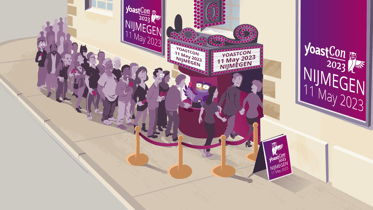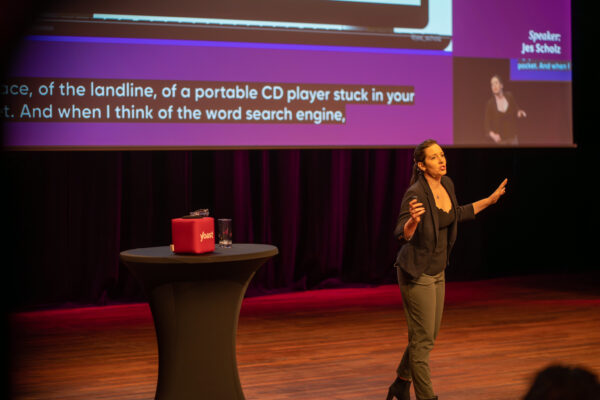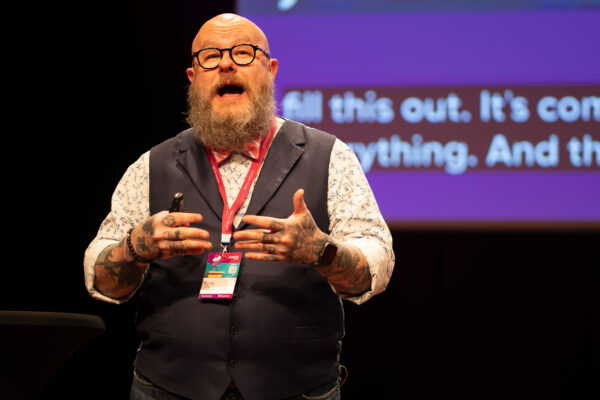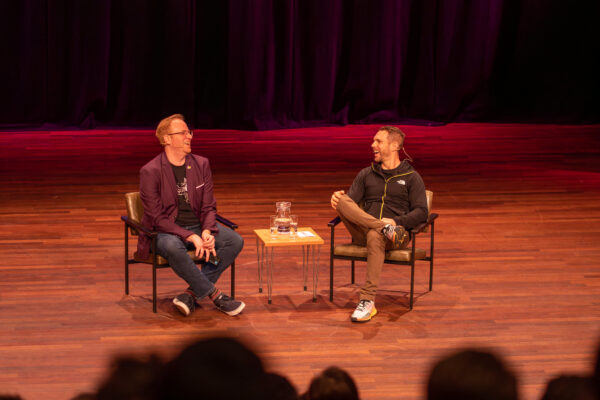YoastCon 2023: 10 takeaways from the SEO conference

Just like that, YoastCon 2023 has come and gone. But what fun we had! Months of preparation went into providing visitors, speakers, and sponsors with the best single conference day of the year. YoastCon was a resounding success, with many in-person attendees and more joining our free live stream. In this post, we’ll take a quick look back at some of the highlights of our SEO conference.
YoastCon 2023 was a success!
YoastCon is an epic SEO conference we put together semi-regularly. At YoastCon, you get to learn all sorts of stuff about SEO, internet marketing, and content creation from the experts. It’s an excellent opportunity to connect with other people who are into digital marketing and upgrade your skills and knowledge.
One of the best parts of YoastCon is getting to hear from all these intelligent people who know a ton about SEO. They give talks, run workshops, and share tips and tricks for improving your website’s search engine rankings, creating excellent content, and which future developments to watch.
YoastCon is also a fun place to hang out, meet new people, and build relationships with other pros in the industry. So if you’re into digital marketing and want to keep up with the latest trends and strategies, YoastCon is an event you should check out. If you missed it this year, make sure to rewatch the videos!
Wondering what you missed?
YoastCon 2023 was indeed the event to attend if you’re seeking to boost your expertise in SEO and attain your business objectives. You got essential insights from the world’s leading SEO professionals, featuring the top two ranked SEO experts, Jes Scholz and Jono Alderson, who provided tons of wisdom and tactics on our main stage. Furthermore, we got to ask Google’s Thierry Muller questions during an interactive fireside chat. The topics discussed at YoastCon 2023 were comprehensive, ranging from news SEO to conversion copywriting and GA4 to user research.
Ten key takeaways from our speakers
You might have missed a talk because you were doing a workshop at YoastCon. Or maybe you were visiting the sponsor booths or simply mingling and networking. Or, perhaps you didn’t attend the SEO conference and want a recap. Whatever the reason, we’ve got you covered! Here are the ten most important takeaways for your SEO and online marketing:
1. Stop seeing Google as a search engine
Jes Scholz, Group Chief Marketing Officer at Swiss media giant Ringier, gave an epic overview of Google’s modern-day ecosystem and how every service it offers is connected. She conveyed that we are no longer in the website optimization business. When you zoom out, you’ll discover that Google isn’t just a search engine anymore. It’s become a colossal ecosystem that includes queryless search experiences like Discover, conversion-oriented ecommerce features, leisure activities on YouTube shorts, and much more.
This change from answering questions to providing journeys presents new ways to reach the right audience. Additionally, it’s radically transforming the user interface of Google SERPs. As a result, ranking at “position one” is no longer as significant. According to Jes, we need to shift our focus from competing for top search rankings to a larger, more holistic perspective and build your brand — as a brandfluencer! — into a trusted Google partner.

2. Yoast SEO does more than you know
The head of SEO at Yoast, Jono Alderson, offered us an incredibly in-depth, high-speed session on what happens behind the scenes of Yoast SEO. Yoast SEO is among the world’s most sophisticated technical SEO tools. Still, its full potential is primarily hidden — only a few ventures beneath the surface to uncover what’s happening and exploit our powerful instruments.
Jono uncovered everything you didn’t know about Yoast SEO and much more! He paid particular attention to the metadata Yoast SEO adds, including the Schema graph it generates for your site. Not only does Yoast SEO do a ton of work for your site, but we’ve also thoroughly documented what it does to help you extend our offering to finetune it for your needs.
3. User research can lead to incredible insights — if done well
Els Aerts co-founded AGConsult, a Belgium-based conversion optimization and customer experience company. During her talk, she dove into the good, the bad, and the ugly of user research. We all know that we need good data to make better decisions. However, poorly developed or conducted user research often results in irrelevant data, leading to poor choices that can harm your bottom line.
Els identifies the pitfalls to keep in mind while performing user research. Among other things, define correctly what you want to achieve, identify the right audience to ask your questions, and, of course, how to ask the right questions without bias. She emphasizes the significance of avoiding these pitfalls to ensure that the data collected is relevant and valuable, leading to informed decisions.
4. Working with an SEO agency is all about communication
Having a successful relationship with your SEO agency is all about communication. Hannah Thorpe, Managing Director of London-based SEO agency Verkeer, shared her insights and strategies on structuring and growing an agency. She talked through what to do – and what not to do – while setting up your SEO team and how to tackle those common problems.
Hannah talked a lot about aligning your business correctly using the business framework VMOST. This helps align between different levels of the organization and helps achieve its goals. VMOST stands for:
- Vision: the overarching goals and aspirations of the company
- Mission: the company’s purpose and reason for being
- Objectives: specific, measurable goals that need to be achieved to make the vision a reality
- Strategies: broad approaches or methods the company will use to achieve its objectives
- Tactics: specific actions or initiatives the company will implement to support the strategies and achieve the objectives.
By following this framework, companies can create a clear roadmap that ensures that each level of operations works together and focuses on the end goals.
5. Batman knows a thing or two about local SEO
Local SEO is different, but many of the same optimizations and practices have worked for years. Google uses a different algorithm to display localized search results, but some marketers and business owners still cling to traditional SEO tactics. In his fast-paced session full of movie imagery and F-bombs, local SEO legend Greg Gifford explained how local SEO differs from traditional SEO, outlining which signals influenced local search visibility and how to optimize each signal.
We learned about local-oriented content, local link building, getting and managing customer reviews, and improving your all-important Google Business Profile. Not only did attendees leave with a detailed list of proven strategies and tactics to help them dominate local search results, but they also got a massive list of movies to watch.

6. The future of WordPress is in doubt
WordPress powers over 40% of the web, making it the most popular choice in CMSs. Endless growth solidified its position. However, there appear to be cracks in the surface. Growth is no guarantee for a bright future, and WordPress needs an innovative edge to retain its position as the leading CMS.
Miriam Schwab, Head of WordPress Relations at Elementor, shows key points the WordPress project needs to solve to keep WordPress the leading CMS for many years. Two of the stand-out points consist of acronyms with an X in them: UX and DX. WordPress needs a better user experience (UX) and a better way of guiding users to become avid, recurring users. But WordPress also needs to improve the developer experience (DX) to help keep them around so they can keep suggesting WordPress as the go-to platform to build stuff on for their clients.
7. People love to buy stuff — get them to buy in your business
So much work goes into helping users through their buying journey that at the end of the journey, writers often forget to give potential customers that final push to get them to buy. Because most writers dislike selling stuff, conversion copywriter Kate Toon showed us that people love to buy things. And it’s okay to talk about something people need or solve a problem for them.
Kate’s talk was full of acronyms describing how to strategically think about selling your stuff. She explained how a well-written sales page, email series, chatbot, or video could sell products and services, making you much money without feeling bad.
8. Whether you like it or not, get ready for GA4
Google Analytics 4 is coming, and the world is not ready. But regardless of your feelings about GA4, for many, it will be the new home for their data reporting. Ecommerce SEO expert Luke Carthy showed us how GA4 could be used to collect custom and super-powerful data to boost conversion and grow sales — it just takes a bit (or actually a lot) more work. And leave your dashboard report to Google Looker Studio.
Hot tip: If looking for alternatives, keep GA4 collecting your data in the background. Should your alternative solution go out of business, you’ll still have a solid data set in your Analytics account.
9. Videos could be precious for your website
Video is enormous today, just look at the popularity of platforms like YouTube and TikTok. But the big challenge is where to start. That’s where video expert Phil Nottingham comes in. Phil is a freelance video SEO consultant who also advises — and writes about video SEO — for Yoast.
In his talk, Phil discussed the importance of video in improving website conversion rates and brand sentiment. He addressed the challenge of what to create, where to put it, and how to measure performance. Phil provided insights on the top five video types every business should create, how to use video to drive more traffic, and benchmarks for success that companies should keep an eye on.
10. Google needs a little help understanding your site
News SEO expert Barry Adams from Polemic Digital showed us how Google discovers, indexes, and ranks news content. News plays a significant role in Google’s ecosystem, as users expect to see the most up-to-date and relevant articles. To deliver this, Google must quickly crawl and index new articles, assess the quality and authority of news publishers, and reveal the appropriate stories in search results. By focusing on news SEO, we gain in-depth insights into Google’s crawling and indexing framework and the signals it employs to assess authority and expertise.
From these learnings, we can distill that you need to help Google’s understanding of your content. Make sure that you nail search intent for your content, optimize your entities, and build your knowledge graph. Using Schema structured data helps greatly, while proper internal linking is invaluable to boosting Google’s understanding of your site.
Google: We must keep working on performance
Google also made an appearance at YoastCon. Software Engineering Manager Thierry Muller from the Switzerland office dropped by for a fireside chat with the Yoast head of SEO, Jono Alderson. Muller has a WordPress and web performance background, so their conversation was big on these two topics. Muller helped form Google’s focus on WordPress.
Google is focused on improving the experience of people online, and one way of doing that is to make CMSes perform better. As WordPress is the most used CMS today, a lot of their time is spent helping bring performance to WordPress. One of the things that came from this was the WordPress Performance team that Google and Yoast started.
But Google is looking into other ways to improve CMSes and think much broader about performance improvements. One idea that Google toyed with was the ability to have Chrome recognize which CMS a site runs, so it can pro-actively optimize rendering based on its knowledge of that CMS. Google also works on things like Project Baseline, which helps developers pick what feature or API is safe to use in your site or web applications.
We all know the other controversial performance improver: AMP. While adoption has stagnated and the project seemed to die slowly, Muller assured us that it is anything but. There will be developments on this front, but we must stay tuned.

Watch the YoastCon stream for a recap
You can rewatch all the YoastCon talks right here, right now! Be sure to relive the inspiring keynote presentations from the comfort of your own home or office. This is a great opportunity when you’ve missed a talk or want to revisit and absorb all the information shared during the conference. Happy watching!
That’s it for YoastCon 2023!
Those were some of the important takeaways for this year’s YoastCon! We want to thank everyone who visited, in person and virtually. Hosting many guests, speakers, and thought leaders at our event was a privilege. We hope everyone learned something valuable, made new connections, and left inspired and motivated.
Don’t forget to share the video on YouTube with colleagues, and share your thoughts and feedback on social media using our conference hashtag #YoastCon2023. Or below this blog post! We’d love to hear your thoughts.

